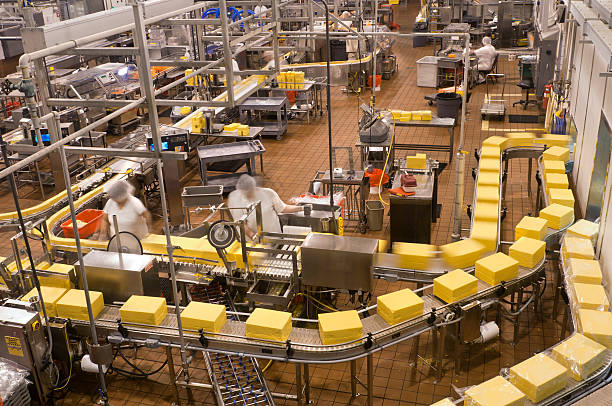Explore the Top Cheese Factory Melbourne for Fresh Creations
Explore the Top Cheese Factory Melbourne for Fresh Creations
Blog Article
An Extensive Take A Look At Cheese Production: Ingredients, Approaches, and the Future of Craftsmen Cheeses
The elaborate process of cheese manufacturing is a remarkable merging of art and science, where high-grade milk, rennet, and specific microbial cultures offer as fundamental components. As the market increasingly prioritizes sustainability and openness, the future of artisan cheeses assures to mirror both heritage and progression.
Secret Ingredients in Cheese Production
A selection of vital ingredients play a critical duty in cheese manufacturing, each adding to the end product's flavor, structure, and character. The key active ingredient in cheese is milk, which can come from different sources, including cows, goats, and lamb - cheese shop melbourne. The type of milk made use of significantly influences the cheese's taste and uniformity; for example, cow's milk commonly generates creamier cheeses, while goat's milk typically creates zesty varieties
One more vital component is rennet, an enzyme used to curdle the milk, dividing it right into curds and whey. The resource of rennet can be animal, vegetable, or microbial, each passing on distinctive characteristics to the cheese.
Salt not only boosts the flavor yet likewise acts as a chemical, preventing the growth of undesirable germs. Additionally, numerous flavor agents, such as herbs, spices, and even smoked timber, can be included in develop one-of-a-kind artisanal cheeses. Together, these ingredients form the foundation of cheese production, setting the phase for diverse and rich cheese selections.
Conventional Cheese-Making Methods
Making use of traditional cheese-making strategies, artisans worldwide protect classic techniques that have been given via generations. These strategies often emphasize using premium, locally sourced milk, which is main to the unique tastes and structures of artisanal cheeses. The process usually begins with the mindful heating of milk, followed by the enhancement of societies and rennet to promote coagulation.
When the curds form, they are reduced, permitting whey to drain, an important step that influences moisture content and appearance. Salting is an important element of this process, boosting flavor while likewise acting as a preservative.
Aging, or affinage, is an additional vital component, throughout which cheeses establish their particular scents and tastes. Artisans might employ certain aging atmospheres, making use of humidity and temperature level controls to fine-tune the cheese's account. The commitment to these typical approaches not just supports local economies however likewise adds to the rich diversity of cheese varieties discovered internationally, commemorating cultural heritage and artisanal workmanship.
Modern Innovations in Cheese Manufacturing
Exactly how have technical innovations changed cheese production in recent years? The integration of modern-day innovation has actually changed both the efficiency and high quality of cheese production.
Furthermore, innovations in microbiology have enabled cheesemakers to select details bacterial cultures and enzymes, optimizing taste profiles and enhancing service life. The use of sensor innovation for keeping an eye on fermentation problems has actually additionally become prevalent, permitting real-time modifications to preserve optimum environments for cheese aging.

These innovations not just improve the top quality and sustainability of cheese production however also equip artisan manufacturers to keep conventional tastes while accepting contemporary effectiveness. As technology continues to develop, the future of cheese manufacturing looks promising, blending custom with innovation.
The Role of Terroir in Cheese
In the realm of cheese manufacturing, terroir plays a pivotal function in specifying the unique attributes of numerous cheeses. Terroir, a French term typically connected with wine, includes the environmental variables that influence agricultural items, consisting of soil structure, climate, and neighborhood plants and animals. In cheese-making, the unique qualities of the region where the milk is sourced can impart specific tastes and textures to the end product.
As an example, the grazing problems of milk pets dramatically affect the milk's make-up, influenced by the kinds of turfs and herbs offered in a specific place. This differs not just in between countries yet additionally between areas within the exact same nation. Furthermore, the microbial communities existing in the environment add to the fermentation procedures, read resulting in diverse accounts in taste and scent.
Cheeses such as Roquefort, Parmigiano-Reggiano, and Cheddar exhibit how terroir can shape their identities, making them distinctive and commonly safeguarded by geographical indications. As manufacturers progressively recognize the relevance of terroir, there is an expanding focus on sourcing local active ingredients and keeping conventional methods, making certain that each cheese really mirrors its origin.

Future Trends in Artisan Cheeses
A noteworthy shift is occurring in the artisan cheese field, driven by evolving consumer preferences and technological developments. Significantly, customers are gravitating towards unique, top quality items that highlight both sustainability Website and regional sourcing - cheese shop melbourne. This pattern is triggering artisan cheesemakers to innovate, concentrating on small-batch manufacturing and the use of typical strategies while incorporating modern technology to improve quality and security
Moreover, there is a growing passion in plant-based and different dairy products, pressing standard cheesemakers to explore new methods, such as cashew or almond-based cheeses. This shift not only accommodates nutritional constraints but also straightens with environmental concerns concerning animal agriculture.
In addition, transparency in sourcing and manufacturing procedures is ending up being vital. Customers are much more educated and need traceability, triggering producers to embrace clearer labeling techniques and involve in storytelling that highlights their approaches and values.
Final Thought
In final thought, the elaborate process of cheese production fuses typical strategies with contemporary technologies, causing a diverse array of flavors and textures. The emphasis on look at these guys top quality components and the impact of terroir underscore the creativity included in cheese production. As the market develops, an emphasis on sustainability and transparency will likely shape the future of artisan cheeses, catering to a significantly critical customer base that values authenticity and workmanship in milk products.
Report this page